- Home
- Peter Straub
Ghost Story Page 3
Ghost Story Read online
Page 3
Panama City? Panama City, Florida? What was he doing there? And with that strange passive girl he had taken with him? Whom he had spirited down through the South?
He had always been the “erratic one,” the “troubled one,” the foil to David’s strength, in the economy of family life his poverty the foil to David’s success; his ambitions and pretensions (“You actually think you can support yourself as a novelist? Even your uncle wasn’t that dumb”: his father) the contrast to David’s hard-working good sense, to David’s steady progress through law school and into a good law firm. And when David had bumped into the daily stuff of his life, it had killed him.
That was the worst thing that had ever happened to him. Until last winter: until Milburn.
The shabby street seemed to open like a grave. He felt as if one more step toward the bottom of the hill and the sleazy movie theaters would take him down, down, as if it would never stop but turn into an endless falling. Something which had not been there before appeared before him, and he squinted to see it more clearly.
Breathlessly he turned around in the piercing sunlight. His elbow caught someone’s chest, and he heard himself murmuring sorry, sorry to an irritated woman in a white sunhat. He unconsciously began to move quickly back up the street. Back there, looking down to the intersection at the bottom of the hill, he had momentarily seen his brother’s tombstone: it had been small, of purple marble, the words David Webster Wanderley, 1939–1975 carved into it, sitting in the middle of the intersection. He fled.
Yes, he had seen David’s tombstone, but David had none. He had been cremated in Holland, and his ashes flown back to their mother. David’s tombstone, yes, with David’s name, but what sent him rushing back up the hill was the feeling that it was for him. And that if he were to kneel in the middle of the intersection and dig up the coffin, within it he would find his own putrefying body.
He turned into the only cool, welcoming place he had seen, the hotel lobby. He had to sit down, to calm himself; beneath the disinterested regard of a desk clerk and a girl behind a magazine counter, he sank down onto a sofa. His face was clammy. The fabric of the sofa’s upholstery rubbed uncomfortably into his back; he leaned forward, ran his fingers through his hair, looked at his watch. He had to appear normal, as if he were just waiting for someone; he had to stop trembling. Potted palm trees had been placed here and there about the lobby. A fan whirled overhead. A thin old man in a purple uniform stood by an open elevator and stared at him: caught, he looked away.
When noises came to him he realized that since seeing the tombstone in the middle of the intersection he had heard nothing. His own pulse had drowned all other sound. Now the efficient noises of hotel life floated in the humid air. A vacuum cleaner hummed on an invisible staircase, telephones dimly rang, the elevator doors closed with a soft whoosh. Around the lobby, small groups of people sat in conversation. He began to feel that he could face the street again.
6
“I’m hungry,” she said.
“I got you some new clothes.”
“I don’t want new clothes, I want food.”
He crossed the room to sit in the empty chair. “I thought you’d get tired of wearing the same dress all the time.”
“I don’t care what I wear.”
“Okay.” He tossed the bag onto her bed. “I just thought you might like them.”
She did not respond.
“I’ll feed you if you answer some questions.”
She turned away from him and began picking at the sheets, wrinkling them and smoothing them out.
“What’s your name?”
“I told you. Angie.”
“Angie Maule?”
“No. Angie Mitchell.”
He let it go. “Why haven’t your parents sent the police out to find you? Why haven’t we been found yet?”
“I don’t have any parents.”
“Everybody has parents.”
“Everybody except orphans.”
“Who takes cares of you?”
“You do.”
“Before me.”
“Shut up. Shut up.” Her face became glossy and self-contained.
“Are you really an orphan?”
“Shut up shut up shut up!”
To stop her screaming he lifted the canned ham out of the box of groceries. “All right,” he said. “I’ll get you some food. We’ll have some of this.”
“Okay.” It was as if she had never screamed. “I want the peanut butter too.”
While he was slicing the ham she said, “Do you have enough money to take care of us?”
She ate in her dedicated way: first she bit off a mouthful of ham, then dipped her fingers in the peanut butter and brought a wad of it home and chewed the two together. “Delicious,” she managed to utter around the food.
“If I go to sleep, you won’t leave, will you?”
She shook her head. “But I can take a walk, can’t I?”
“I guess so.”
He was drinking a can of beer from a six-pack he had picked up at the little store on his way back; the beer and the food together made him drowsy, and he knew that if he did not get to bed, he would fall asleep in the chair.
She said, “You don’t have to tie me onto you. I’ll come back. You believe me, don’t you?”
He nodded.
“Because where could I go? I don’t have anywhere to go.”
“Okay!” he said. Once again, he could not talk to her as he wished: she was in control. “You can go out, but don’t be gone too long.” He was acting like a parent: he knew that she had put him in this role. It was ludicrous.
He watched her go out of the mean little room. Later, rolling over in bed, he dimly heard the door clicking shut and knew that she had, after all, come back. So she was his.
* * *
And that night he lay on his bed, fully dressed, watching her sleep. When his muscles began to ache from being held so long in the same position, he shifted his body on the bed; in this way, over a period of two hours, he went from lying on his side and supporting his head on his hand to sitting up with his knees raised and his hands crossed behind his head to leaning forward, elbows on knees, and finally back to lying on his side, cocked up on one elbow: as if all these postures were elements of a formal round. His eyes scarcely ever left the girl. She lay absolutely still—sleep had taken her somewhere else and left only her body behind. Simply lying there, both of them lying there, she had escaped him.
He rose, went to his suitcase and took out the rolled-up shirt and went back to stand beside his bed. He held the shirt by the collar and let gravity carry the hunting knife to the bed, unrolling the shirt as it fell. When it hit the bed it was too heavy to bounce. Wanderley picked it up and hefted it.
Holding the knife once again behind his back, he shook the girl’s shoulder. Her features seemed to blur before she turned over and dug her face into the pillow. He grasped her shoulder again and felt the long thin bone, the prominent wing jutting out from her back. “Go ‘way,” she muttered into the pillow.
“No. We’re going to talk.”
“It’s too late.”
He shook her, and when she did not respond, tried to roll her over by force. Thin and small as she was, she was strong enough to resist. He could not make her face him.
Then she turned over by herself, as if in contempt. Lack of sleep showed in her face, but beneath the puffiness she looked adult.
“What’s your name?”
“Angie.” She smiled carelessly. “Angie Maule.”
“Where do you come from?”
“You know.”
He nodded.
“What were your parents’ names?”
“I don’t know.”
“Who took care of you before I picked you up?”
“It doesn’t matter.�
�
“Why not?”
“They aren’t important. They were just people.”
“Was their name Maule?”
Her smile became more insolent. “Does it matter? You think you know everything anyhow.”
“What do you mean, ‘They were just people’?”
“They were just people named Mitchell. That’s all.”
“And you changed your name yourself?”
“So what?”
“I don’t know.” That was true.
So they looked at one another, he sitting on the edge of the bed, holding the knife behind him and knowing that whatever was going to happen, he would be unable to use it. He supposed that David too had been unable to take life—any life but his own, if he had done that. The girl probably knew he was holding the knife, he thought, and simply dismissed it as a threat. It was not a threat. He too was probably not a threat. She had never been even apprehensive of him.
“Okay, let’s try again,” he said. “What are you?”
For the first time since he had taken her into the car, she really smiled. It was a transformation, but not of a kind to make him feel easier: she did not look any less adult. “You know,” she said.
He insisted. “What are you?”
She smiled all through her amazing response. “I am you.”
“No. I am me. You are you.”
“I am you.”
“What are you?” It came out in despair, and it did not mean what he had meant the first time he asked it.
Then just for a second he was back on the street in New York, and the person before him was not the stylish suntanned anonymous woman, but his brother David, his face crumbled and his body dressed in the torn and rotting clothing of the grave.
. . . the most dreadful thing . . .
Part One
After Jaffrey’s Party
Don’t the moon look lonesome, shinin’ through the trees?
Don’t the moon look lonesome, shinin’ through the trees?
—Blues
I
The Chowder Society: The October Stories
America’s first fictional heroes were old men.
—Robert Ferguson
Milburn Observed Through Nostalgia
One day early in October Frederick Hawthorne, a seventy-year-old lawyer who had lost very little to the years, left his house on Melrose Avenue in Milburn, New York, to walk across town to his offices on Wheat Row, just beside the square. The temperature was a little colder than Milburn expected so early in its autumn, but Ricky wore his winter uniform of tweed topcoat, cashmere muffler and gray, no-nonsense hat. He walked a little briskly down Melrose Avenue to warm up his blood, moving beneath huge oaks and smaller maples already colored heart-wrenching shades of orange and red—another unseasonal touch. He was susceptible to colds, and if the temperature dropped another five degrees, he’d have to drive.
But in the meantime, as long as he could keep the wind from his neck, he enjoyed the walk. After he had turned out of Melrose Avenue toward the square, he was warm enough to go at a more leisurely pace. Ricky had little reason to rush to his office: clients rarely appeared before noon. His partner and friend, Sears James, probably would not appear for another forty-five minutes, and that gave Ricky enough time to amble through Milburn, saying hello to people and observing the things he liked to observe.
What he chiefly liked to observe was Milburn itself—Milburn, the town in which all of his life except for his time in university, law school and the army had been spent. He had never wanted to live anywhere else, though in the early days of his marriage, his lovely and restless wife had often claimed that the town was boring. Stella had wanted New York—had wanted it resolutely. That had been one of the battles he had won. It was incomprehensible to Ricky that anyone could find Milburn boring: if you watched it closely for seventy years, you saw the century at work. Ricky imagined that if you watched New York for the same period, what you saw would be mainly New York at work. Buildings went up and down too fast there for Ricky’s taste, everything moved too quickly, wrapped in a self-absorbed cocoon of energy, whirling too fast to notice anything west of the Hudson but the Jersey lights. Also, New York had a couple of hundred thousand lawyers; Milburn had only five or six that counted, and he and Sears had been for forty years the most prominent of these. (Not that Stella had ever cared a whit about Milburn’s notions of prominence.)
He entered the business district which lay along two blocks west of the square and continued for two blocks along the other side, passed Clark Mulligan’s Rialto theater, and paused to look at the marquee. What he saw there made him wrinkle his nose. The posters on the front of the Rialto showed the blood-streaked face of a girl. The kind of movies Ricky liked could now be seen only on television: for Ricky, the film industry had lost its bearings about the time William Powell had retired. (He thought that Clark Mulligan probably agreed with him.) Too many modern films were like his dreams, which had become particularly vivid during the last year.
Ricky turned dismissively away from the theater and faced a prospect far more pleasing. The original high frame houses of Milburn had endured, even if nearly all of them were now office buildings: even the trees were younger than the buildings. He walked, his polished black shoes kicking through crisp leaves, past buildings much like those on Wheat Row and accompanied memories of his boyhood self down these same streets. He was smiling, and if any of the people he greeted had asked him what he was thinking about, he might (if he allowed himself to be so pompous) have said: “Why, sidewalks. I’ve been thinking about sidewalks. One of my earliest memories is of the time they put in the sidewalks along the whole stretch of Candlemaker Street here, right down to the square. Hauling those big blocks up with horses. You know, sidewalks made a greater contribution to civilization than the piston engine. Spring and winter in the old days you had to wade through mud, and you couldn’t enter a drawing room without tracking some of it in. Summers, the dust was everywhere!” Of course, he reflected, drawing-rooms had gone out just about the time the sidewalks had come in.
When he reached the square he found another unhappy surprise. Some of the trees lining the big grassy space were already completely bare, and most of the others had at least a few bare limbs—there was still plenty of the color he’d been anticipating, but during the night the balance had turned and now black skeletal arms and fingers, the bones of the trees, hung against the leaves like signposts to winter. Dead leaves carpeted the square.
“Hi, Mr. Hawthorne,” someone beside him said.
He turned and saw Peter Barnes, a high school senior whose father, twenty years younger than Ricky, was in the second periphery of his friends. The first circle consisted of four men his own age—there had been five, but Edward Wanderley had died almost a year earlier. More somberness, when he was determined not to be somber. “Hello, Peter,” he said, “you must be on your way to school.”
“It starts an hour late today—the heaters broke again.”
Peter Barnes stood beside him, a tall amiable-looking boy in a ski sweater and jeans. His black hair seemed almost girlishly long to Ricky, but the width of his shoulders promised that when he started to fill out, he would be a much bigger man than his father. Presumably his hair didn’t look girlish to girls. “Just walking around?”
“That’s right,” Peter said. “Sometimes it’s fun just to walk around town and look at things.”
Ricky nearly beamed. “Why that’s right! I feel exactly the same thing myself. I always enjoy my walks across town. The strangest things pop into my head. I was just thinking that sidewalks changed the world. They made everything much more civilized.”
“Oh?” said Peter, looking at him curiously.
“I know, I know—I told you strange things occur to me. Heavens. How is Walter these days?”
“He’s fine. He’s at the ba
nk now.”
“And Christina, she’s fine too?”
“Sure,” Peter said, and there was a touch of coolness in his response to the question about his mother. A problem there? He remembered that Walter had complained to him some months before that Christina had become a little moody. But for Ricky, who could remember Peter’s parents’ generation as teenagers, their problems were always a little fictional—how could people with the world still in front of them have truly serious problems?
“You know,” he said, “we haven’t talked like this in ages. Is your father reconciled to your going to Cornell yet?”
Peter smiled wryly. “I guess so. I don’t think he knows how tough it is to get into Yale. It was a lot easier when he went.”
“No doubt it was,” said Ricky, who had just remembered the circumstances under which he had last had a conversation with Peter Barnes. John Jaffrey’s party: the evening on which Edward Wanderley had died.
“Well, I guess I’ll poke around in the department store for a while,” Peter said.
“Yes,” Ricky said, remembering against his will all the details of that evening. It seemed to him at times that life had darkened since that night: that a wheel had turned.
“I guess I’ll go now,” Peter said, and stepped backward.
“Oh, don’t let me hold you up,” Ricky said. “I was just thinking.”
“About sidewalks?”
“No, you scamp.” Peter turned away, smiling and saying goodbye, and strode easily up the side of the square.
Ricky spotted Sears James’s Lincoln cruising past the Archer Hotel at the top of the square, going as usual ten miles an hour slower than anyone else, and hurried on his way to Wheat Row. Somberness had not been evaded: he saw again the skeletal branches thrusting through the brilliant leaves, the implacable bloodied face of the girl on the film poster, and remembered that it was his turn to tell the story at the Chowder Society meeting that night. He hastened on, wondering what had become of his high spirits. But he knew: Edward Wanderley. Even Sears had followed them, the other three members of the Chowder Society, into that gloom. He had twelve hours to think of something to talk about.

 Poe's Children: The New Horror: An Anthology
Poe's Children: The New Horror: An Anthology Koko
Koko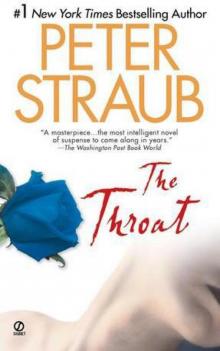 The Throat
The Throat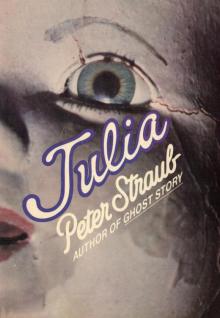 Julia
Julia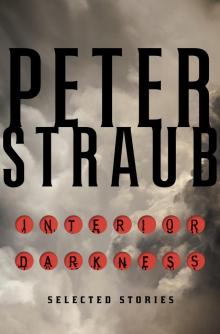 Interior Darkness: Selected Stories
Interior Darkness: Selected Stories A Dark Matter
A Dark Matter Floating Dragon
Floating Dragon Houses Without Doors
Houses Without Doors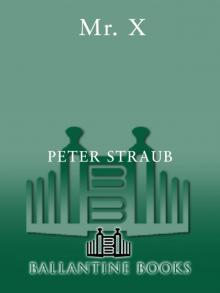 Mr. X
Mr. X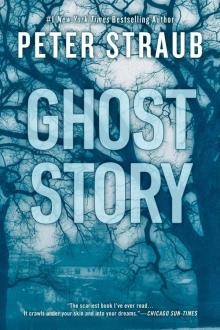 Ghost Story
Ghost Story Mystery
Mystery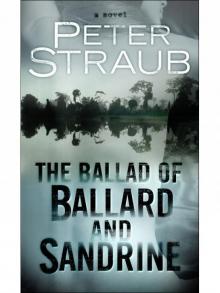 The Ballad of Ballard and Sandrine
The Ballad of Ballard and Sandrine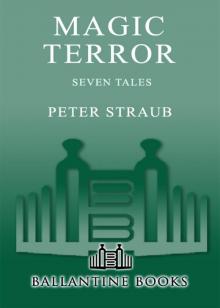 Magic Terror
Magic Terror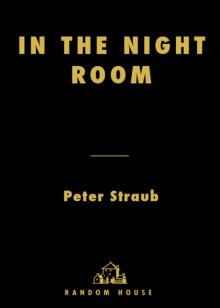 In the Night Room
In the Night Room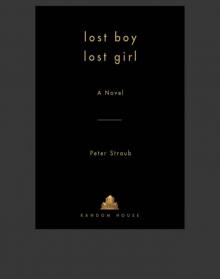 Lost Boy Lost Girl
Lost Boy Lost Girl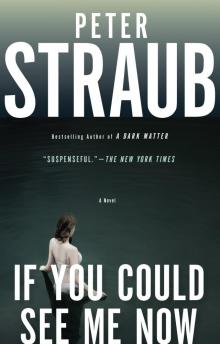 If You Could See Me Now
If You Could See Me Now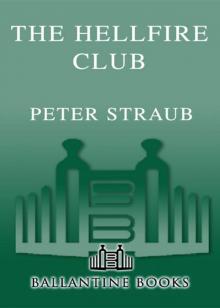 The Hellfire Club
The Hellfire Club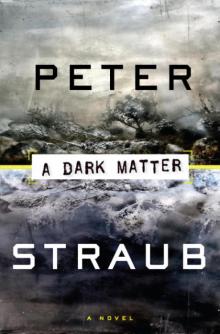 A Dark Matter: A Novel
A Dark Matter: A Novel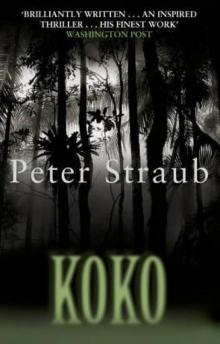 Koko brt-1
Koko brt-1 Shadowland
Shadowland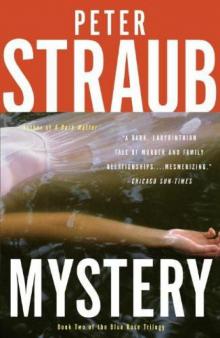 Mystery brt-2
Mystery brt-2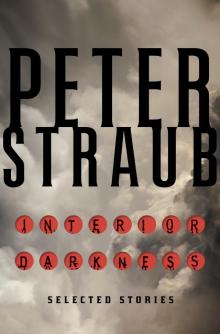 Interior Darkness
Interior Darkness Poe's Children
Poe's Children